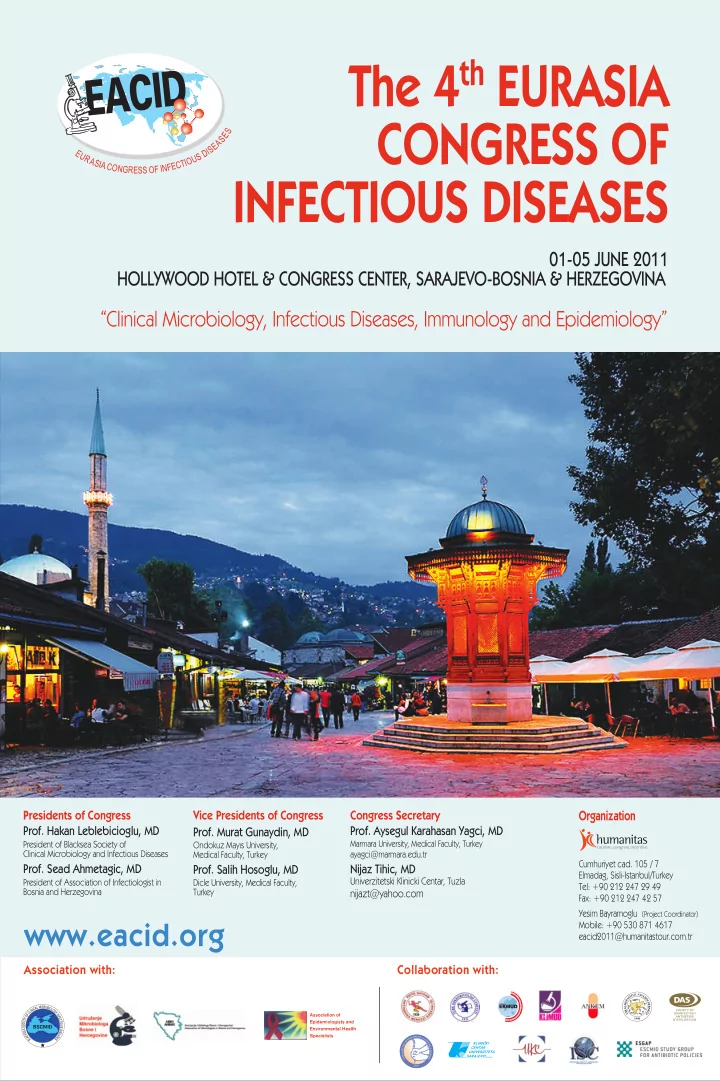

The 4 th EURASIA CONGRESS OF INFECTIOUS DISEASES 01-05 JUNE 2011 HOLLYWOOD HOTEL & CONGRESS CENTER, SARAJEVO-BOSNIA & HERZEGOVINA Presidents of Congress Vice Presidents of Congress Congress Secretary Organization Prof. Hakan Leblebicioglu, MD Prof. Aysegul Karahasan Yagci, MD Prof. Murat Gunaydin, MD Marmara University, Medical Faculty, Turkey President of Blacksea Society of Ondokuz Mayıs University, Clinical Microbiology and Infectious Diseases Medical Faculty, Turkey ayagci@marmara.edu.tr Cumhuriyet cad. 105 / 7 Prof. Sead Ahmetagic, MD Nijaz Tihic, MD Prof. Salih Hosoglu, MD Elmadag, Sisli-Istanbul/Turkey Univerzitetski Klinicki Centar, Tuzla President of Association of Infectiologist in Dicle University, Medical Faculty, Tel: +90 212 247 29 49 Bosnia and Herzegovina Turkey nijazt@yahoo.com Fax: +90 212 247 42 57 Yesim Bayramoglu (Project Coordinator) www.eacid.org Mobile: +90 530 871 4617 eacid2011@humanitastour.com.tr Association with: Collaboration with:
Early W arning and Epidem ic I ntelligence in the Mediterranean regions and Balkans countries Fatima Ait Belghiti, P. Barboza, C. Giese, E. Anis M. Bromberg, M. Bejaoui M. Bengo, A. Fenech C. Gauci J. Maistre Mellilo T Mellilo, R. Haddadin S. Hussein, S. Husseini A. Leventhal, A. Kalaveshi N. Ramadani, D. Lausevic Z. Vratnica, B. Madi B. Rimawi, A. Rguig M. Youbi for the EpiSouth network International Departent, Institut de Veille Sanitaire (InVS), France EURASIA congress, 2 June 2011, Sarajevo, Bosnia-Herzegovina.
Epidemic Intelligence (EI) • Intense circulation of goods and people � communicable diseases know no borders • Capacity to identify risk emerging internationally • International surveillance not sufficient � pro-active approach � Identification of health events with potential risk for EpiSouth countries and their populations � Early warning communication
Epidemic Intelligence Epidemic Intelligence Concept Concept EpiSouth cross-border EI International EI Surveillance and notification of Surveillance and notification of events events I NSI DE Episouth region OUTSI DE Episouth region 0 2 4 8 12 1 6 D e ré g s d éc im u a x < D o u b le -cliq u e z p o u r s a isir le te x te >
The goal is to... The goal is to...
Epidemic Intelligence Epidemic Intelligence Concept Concept • Detection of potential health threats through the use of formal & informal sources (eg. Media) • Not all countries have expertise nor resources to develop full-fledged EI • High level for potential duplication • Process – Identification of primary signals via dedicated Expert system – Detection and selection of relevant signals – Analysis – Validation – Communication • Tailored to EpiSouth needs • Outputs : – EpiSouth Weekly epidemiological Bulletin e-Web Since March 09 (> 167 bulletins) – Thematic notes issued on ad hoc basis on various topic (CCHF, West nile, A/H1N1, AlKurma virus) – All available online in the EpiSouth site http://www.episouth.org
Cross border EW Cross border EW • Mediterranean Alert Early warning system • Secured web site (confidential) • To share national alerts • Operational since November 09 • Accessible to – EpiSouth FP • NPHI, MoH – Majors Stakeholders • WHO • ECDC, EU commission • Complements existing systems – WHO – E.U. / ECDC
West Nile virus circulation in the EpiSouth countries
The progressive expansion of the Novel A(H1N1)v epidemic in the EpiSouth region (Mediterranean and Balkans)
Focus on EpiSouth region Focus on EpiSouth region • Source of data: EpiSouth countries • Data collected: – Confirmed cases – Case definition and case management strategies – Deaths / severe cases – Community transmission: circulation intensity – Imported VS local cases • Descriptive analysis on a weekly basis • Information shared with the network : – Daily bulletin (the first 2 months); – Twice a week (intermediate period) – Weekly bulletin (until the end)
Chronological A(H1N1) evolution Chronological A(H1N1) evolution (detected cases reported) (detected cases reported) 11 May 2009 31 May 2009 08 June 2009 13 July 2009
Evolution by « « sub sub- -region region » » Evolution by Cumulative A(H1N1)2009 confirmed cases, EpiSouth sub-regions, as of 28 July (week 31).
Episouth Network Episouth Network Added Values Added Values Global crises = Global response • It raised awareness on regional and cross-border issues • Created trust, cohesion and concrete collaboration among PH officers of 27 countries • Fills a gap in a region where countries belong to different political/supranational entities that is not addressed, as a whole, neither by the European Commission nor by WHO • In case of major threats, pooling internationally available capacities will . strengthen health security � Key role for regional networks
Acknow ledgem ents All EpiSouth Participating countries The EpiSouth-Plus project is implemented by the Italian National Institute of Health and is co-funded by the European Union DG SANCO/ EAHC and EuropeAid together with the participating national partner Institutions. The financial support of the Italian Ministry of Health and ECDC is also acknowledged. The contents of this presentation are the sole responsibility of the authors and can in no way be taken to reflect the views of the European Union.
Thank you for your attention.. ًٲڒﮕُﺷ http://www.episouth.org/index.html
Recommend
More recommend